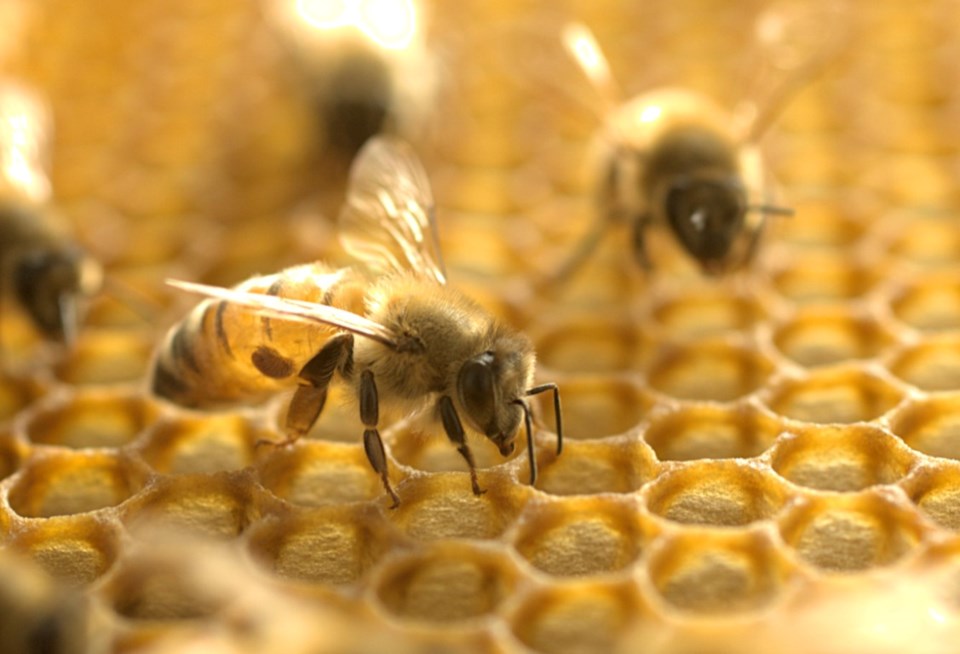SASKATOON — When Ukrainian university student Sofiia Markova applied for a research internship in Canada last fall, she was looking forward to furthering her studies in a state-of-the-art lab. What she didn’t expect was that — hiding in her basement when Russian troops invaded her town — she’d be fearing for her life when it came time to depart, not knowing whether she’d even survive, let alone make it out of her country to go overseas.
Now, Markova is safely settled in Saskatoon and applying her leading-edge expertise — through the Mitacs Globalink Research Internship program — to solve Canada’s critical honeybee shortage, with the goal of ultimately protecting Canadian blueberry crops, the country’s top fruit export that accounts for more than 60 per cent of export dollars.
Markova, an undergraduate veterinary student at the National University of Life and Environmental Sciences of Ukraine (NULES) in Kyiv, has been working under the guidance of University of Saskatoon Professor Elemir Simko and Associate Professor Sarah Wood in the Department of Veterinary Pathology since May. Her project is the first to study the effects of disease-causing bacteria using live bee larvae as opposed to artificial media in a test tube. Specifically, she is concentrating on the different strains of bacteria responsible for European Foulbrood (EFB) disease — expected to be a leading cause of bee colony loss this coming spring when bees are required for blueberry pollination.
“When the war started, it was very dangerous to leave Kyiv. I was concentrating on survival and didn’t really think about my internship,” said Markova, one of more than 60 Ukrainian students who took part in the Mitacs Globalink Research Internship program across Canada this year. “I’m extremely grateful to Mitacs and my new Canadian friends here in Saskatoon for giving me this opportunity.”
Markova’s work, which required her to learn the role of beekeeper, involved transferring honeybee larvae from field colonies into the Saskatoon lab where they were infected with bacteria and then monitored for six days to determine which strains were growing the fastest and causing the most harm. By proving a live model does work, Markova is giving beekeepers an unprecedented opportunity to learn exactly how specific strains of bacteria affect the midgut of the larvae, providing valuable information to control EFB disease before it becomes problematic in a hive.
“We need healthy honeybees to pollinate our blueberries and right now, this disease is compromising honeybee colony strength and productivity,” explained Wood, who was recently named the university’s first Research Chair in Pollinator Health. “In order to ensure an abundant blueberry crop next spring, we need to better understand the bacteria that causes this disease,” she added.
“The real advantage of this project is that it’s more field realistic to watch how bacteria grows within larvae compared to a test tube,” said Wood. “We know that blueberry growers are finding it difficult to acquire pollination services due to bee health issues. There’s a strong need to address those issues going forward and Sofiia’s results will help.”
As Eric Gerbrandt, Research Director of the B.C. Blueberry Council, explained: “Healthy bee colonies are essential to blueberry production, making our continued support for the University of Saskatchewan’s research a high priority for B.C. blueberry growers. Better understanding of bee diseases will lead to more sustainable blueberry production and improved food security for Canada, and the work funded by Mitacs with students like Sofiia is expected to have a lasting positive impact on the interface between blueberry and honey producers.”
The opportunity to do meaningful work has been extremely fulfilling for Markova, who will be extending her internship this fall and plans to return to Canada again in the future to obtain her Master’s degree. “This is a great learning experience that combines both field work and lab work, and exposes me to modern equipment I would not have had the opportunity to use in Ukraine,” she said.
“We only started our honeybee research six years ago and we would not be where we are today without the support of Mitacs,” said Simko, who has worked with more than 10 Mitacs interns to date, including Markova.
“We’re addressing very tangible and concrete problems facing the beekeeping and blueberry industries, among others,” he added. “At the same time, we’re helping to develop expertise among international students who can continue to build on that experience when they return home.”
In total, 2,199 students from 35 have taken part in the Mitacs Globalink program this year to help solve complex problems across a range of industry sectors, from health and wellness, to robotics, technology and the environment. Designed to foster international research links and boost Canada’s economy, the 12-week internships are available at more than 70 universities.
Since 2009, Mitacs has matched more than 8,000 senior undergraduates with Canadian faculty through its Globalink research internships. The program promotes Canada as a top destination for research opportunities and showcases Canadian research expertise around the world.
“Mitacs is very proud to be supporting more than 60 Ukrainian students through its Globalink Research Internship this year — part of our broader efforts to help those affected by the war. Research like Sofiia’s will ultimately help people in Canada, in Ukraine, and beyond,” said Mitacs CEO John Hepburn. “The Mitacs Globalink Research Internship helps participants gain research experience here in Canada, advancing innovation and creating attractive opportunities for international students who often decide to further their education here.”




